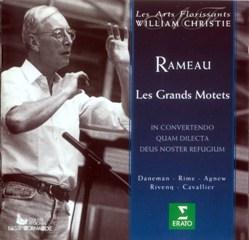Rameau – Les Grands Motets (1994)
Rameau – Les Grands Motets (1994)

In Convertendo (C. 1718) 23:11 1 1. Gravement "In Convertendo" 2:57 2 2. Gai "Tunc Repreltum Est Gaudio Os Nostrum" 3:07 3 3. Lent - Très Gai "Magnificavit Dominus" 3:26 4 4. Lent "Converte Domine Captivitatem Nostram" 2:09 5 5. Chœur Gracieux : Un Peu Gai "Laudate Nomen Dei Cum Cantico" 4:04 6 6. Trio : Animé "Qui Seminant In Lacrimis" 2:19 7 7. Chœur : Sans Lenteur "Euntes Ibant Et Flebant" 5:09 Quam Dilecta (C. 1716) 20:20 8 1. Tendrement "Quam Dilecta" 4:10 9 2. Tendrement "Cor Meum Et Caro Mea" 2:42 10 3. Gratieusement "Et Enim Passer" 2:54 11 4. Trio : Gravement "Altaria Tua" 2:14 12 5. Prélude : Légèrement Et Marqué "Beati, Qui Habitant" 2:21 13 6. Gravement : "Domine, Deus Virtutum" 2:26 14 7. "Domine Virtutum Beatus Homo" 3:22 Deus Noster Refugium (C. 1720) 26:38 15 1. "Deus Noster Refugium" 2:57 16 2. Trio "Propterea Non Timebimus 2:39 17 3. Prélude Du Chœur : Vivement "Sonuerunt Et Turbatae Sunt" 3:31 18 4. Gayment "Fluminis Impetus" 2:23 19 5. Doux "Deus In Medio Ejus" 1:38 20 6. Quatuor "Conurbatae Sunt Gentes" 2:26 21 7. Prèlude Du Chœur : Gay "Dominus Virtutum Nobiscum" 3:03 22 8. Légèrement "Venite Et Videte" 3:01 23 9. Légèrement "Arcum Conteret Et Confringent Arma" 1:55 24 10. Prélude Du Chœur : Gay "Dominum Virtutum Nobiscum" 3:05 Noémi Rime, Sophie Daneman – soprano Paul Agnew – countertenor Nicolas Rivenq – baritone Nicolas Cavallier – bass Simon Heyerick – violin (solo) Les Arts Florissants William Christie – conductor
The genre of the French motet was painstakingly defined by a long line of masters and lesser exponents working at the Louvre and in the royal parishes. In the course of the 17th century they invented the national equivalent of the German cantata.
The grand motet, lasting about twenty minutes, was performed at the beginning of the Mass and was one of the three pieces of music heard by the King and his court at the daily religious services. It was followed by a short motet performed during the Elevation, and then by the Domine salvum fac regem, a final motet in which the full range of musical forces were brought into play. An inseparable part of the religious practice of the Ancien Régime, the grand motet is the supreme example of French sacred music.
Jean-Philippe Rameau, who composed for the churches and cathedrals of Avignon, Clermont-Ferrand, Montpellier and Dijon, produced a great number of sacred works to be performed by cathedral choirs. Only three examples from this highly creative period survive: In convertendo Dominum, Deus Noster Refugium and Quam Dilecta Tabernacula. A fourth motet, Exultet coelum laudibus, is thought to have been lost. These works predate Rameau's move to Paris and must first have been heard within the walls of Dijon and Lyon. --- arts-florissants.com
download (mp3 @320 kbs):
yandex 4shared mega mediafire cloudmailru uplea ge.tt








